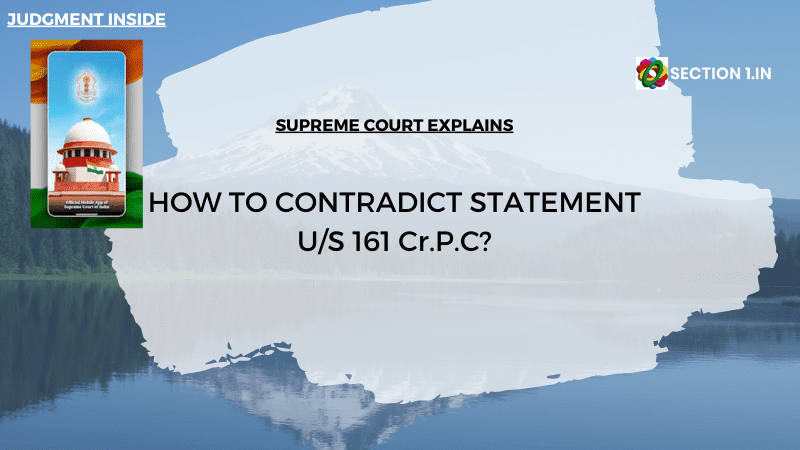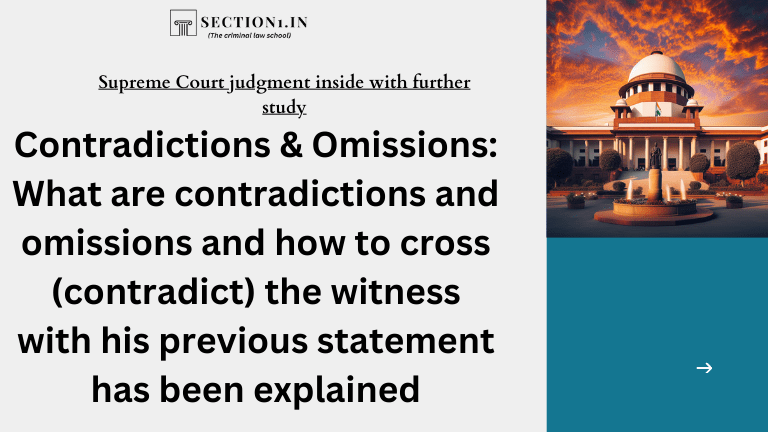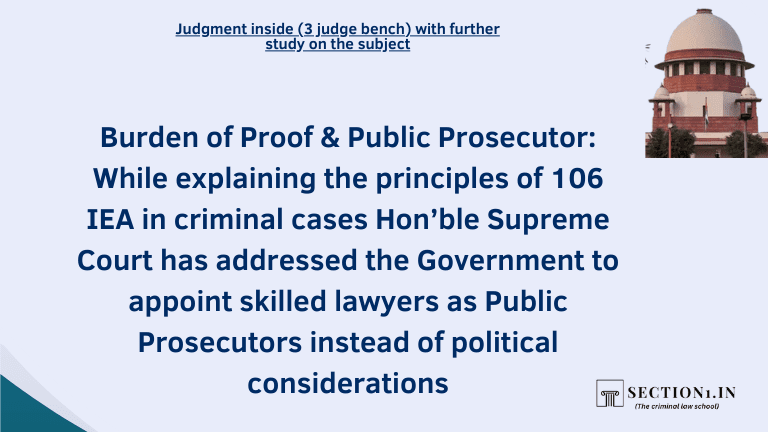How to write FIR? – Explained
12. FIR is not meant to be an encyclopaedia nor is it expected to contain all the details of the prosecution case. It may be sufficient if the broad facts of the prosecution case are stated in the FIR. Complaint was lodged within few hours after the tragic event. PW-1 has lost his young daughter just married before six weeks in unnatural circumstances. Death of a daughter within few days of the marriage, the effect on the 11 Page 12 mind of the father-PW1 cannot be measured by any yardstick. While lodging the report, PW-1 must have been in great shock and mentally disturbed. Because of death of his young daughter being grief stricken, it may not have occurred to PW-1 to narrate all the details of payment of money and the dowry harassment meted out to his daughter. Unless there are indications of fabrication, prosecution version cannot be doubted, merely on the ground that FIR does not contain the details.
Depricating the practice of lawyers drawing attention of the judges on 161 Cr.P.C statements
13. Mr. K.T.S. Tulsi, learned Senior Counsel for the appellants submitted that FIR contains only allegations of torture and cruel behavior on the part of the appellants towards the deceased and in his statement recorded by the police under Section 161 Cr.P.C., PW-1 had not stated anything about the alleged dowry demand whereas in his statement recorded by the police, PW-1 had only stated about many restrictions imposed on his daughter due to which Archana felt suffocated. Contending that there were no allegations of cruelty in connection with dowry demand or any such conduct of the appellants which could have driven Archana to commit suicide either in the FIR or in the 12 Page 13 statement of PW-1 recorded on the next day by the investigating officer, the learned Senior Counsel urged and tried to persuade us to “look into the statement of PW-1 recorded under Section 161 Cr.P.C”.
14. Section 161 Cr.P.C. titled “Examination of witnesses by police” provides for oral examination of a person by any investigating officer when such person is supposed to be acquainted with the facts and circumstances of the case. The purpose for and the manner in which the police statement recorded under Section 161 Cr.P.C can be used at any trial are indicated in Section 162 Cr.P.C. Section 162 Cr.P.C. reads as under:
162. Statements to police not to be signed–Use of statements in evidence.–(1) No statement made by any person to a police officer in the course of an investigation under this Chapter, shall, if reduced to writing, be signed by the person making it; nor shall any such statement or any record thereof, whether in a police diary or otherwise, or any part of such statement or record, be used for any purpose, save as hereinafter provided, at any inquiry or trial in respect of any offence under investigation at the time when such statement was made: Provided that when any witness is called for the prosecution in such inquiry or trial whose statement has been reduced into writing as aforesaid, any part of his statement, if duly proved, may be used by the accused, and with the permission of the Court, by the prosecution, to contradict such witness in the manner provided by section 145 of the Indian Evidence Act, 1872 (1 of 1872); and when any part of such 13 Page 14 statement is so used, any part thereof may also be used in the re-examination of such witness, but for the purpose only of explaining any matter referred to in his cross-examination. (2) Nothing in this section shall be deemed to apply to any statement falling within the provisions of clause (1) of section 32 of the Indian Evidence Act, 1872 (1 of 1872), or to affect the provisions of section 27 of that Act. Explanation.- An omission to state a fact or circumstance in the statement referred to in sub-section (1) may amount to contradiction if the same appears to be significant and otherwise relevant having regard to the context in which such omission occurs and whether any omission amounts to a contradiction in the particular context shall be a question of fact.
15. Section 162 Cr.P.C. bars use of statement of witnesses recorded by the police except for the limited purpose of contradiction of such witnesses as indicated there. The statement made by a witness before the police under Section 161(1) Cr.P.C. can be used only for the purpose of contradicting such witness on what he has stated at the trial as laid down in the proviso to Section 162 (1) Cr.P.C. The statements under Section 161 Cr.P.C. recorded during the investigation are not substantive pieces of evidence prosecution but with the leave of the Court and (iii) the re-examination of the witness if necessary.
16. Court cannot suo moto make use of statements to police not proved and ask question with reference to them which are inconsistent with the testimony of the witness in the court. The words in Section 162 Cr.P.C. “if duly proved” clearly show that the record of the statement of witnesses cannot be admitted in evidence straightway nor can be looked into but they must be duly proved for the purpose of contradiction by eliciting admission from the witness during cross-examination and also during the cross-examination of the investigating officer. Statement before the investigating officer can be used for contradiction but only after strict compliance with Section 145 of Evidence Act that is by drawing attention to the parts intended for contradiction. but can be used primarily for the limited purpose:- (i) of contradicting such witness by an accused under Section 145 of Evidence Act; (ii) the contradiction of such witness also by the prosecution but with the leave of the Court and (iii) the re-examination of the witness if necessary.
16. Court cannot suo moto make use of statements to police not proved and ask question with reference to them which are inconsistent with the testimony of the witness in the court. The words in Section 162 Cr.P.C. “if duly proved” clearly show that the record of the statement of witnesses cannot be admitted in evidence straightway nor can be looked into but they must be duly proved for the purpose of contradiction by eliciting admission from the witness during cross-examination and also during the cross-examination of the investigating officer. Statement before the investigating officer can be used for contradiction but only after strict compliance with Section 145 of Evidence Act that is by drawing attention to the parts intended for contradiction.
17. Section 145 of the Evidence Act reads as under:
145. Cross-examination as to previous statements in writing.- A witness may be cross-examined as to previous statements made by him in writing or reduced into writing, and relevant to matters in question, without such writing being shown to him, or being proved; but, if it is intended to contradict him by the writing, his attention must, before the writing can be proved, be called to those parts of it which are to be used for the purpose of contradicting him.
How to record the contradiction by the Trial court?
18. Under Section 145 of the Evidence Act when it is intended to contradict the witness by his previous statement reduced into writing, the attention of such witness must be called to those parts of it which are to be used for the purpose of contradicting him, before the writing can be used. While recording the deposition of a witness, it becomes the duty of the trial court to ensure that the part of the police statement with which it is intended to contradict the witness is brought to the notice of the witness in his cross-examination. The attention of witness is drawn to that part and this must reflect in his cross-examination by reproducing it. If the witness admits the part intended to contradict him, it stands proved and there is no need to further proof of contradiction and it will be read while appreciating the evidence. If he denies having made that part of the statement, his attention must be drawn to that statement and must be mentioned in the deposition. By this process the contradiction is merely brought on record, but it is yet to be proved. Thereafter when investigating officer is examined in the court, his attention should be drawn to the passage marked for the purpose of contradiction, it will then be proved in the deposition of the investigating officer who again by referring to the police statement will depose about the witness having made that statement. The process again involves referring to the police statement and culling out that part with which the maker of the statement was intended to be contradicted. If the witness was not confronted with that part of the statement with which the defence wanted to contradict him, then the court cannot suo moto make use of statements to police not proved in compliance with Section 145 of Evidence Act that is, by drawing attention to the parts intended for contradiction.
19. In the case at hand, PW-1 was not confronted with his statement recorded by the police under Section 161 Cr.P.C. to prove the contradiction nor his statement marked for the purpose of contradiction was read out to the investigating officer. When neither PW-1 nor the investigating officer were confronted with the statement and questioned about it, “PW-1’s statement recorded under Section 161 Cr.P.C. cannot be looked into for any purpose much less to discredit the testimony of PW-1 and the prosecution version”.
Party
V.K.MISHRA & ANR. v. STATE OF UTTARAKHAND & ANR. Cri. Apl. No: 1247 OF 2012 – JULY2 8, 2015 – [2015] 8 S.C.R. 1 [T. S. THAKUR, R. K. AGRAWAL AND R. BANUMATHI, JJ.].
Download judgment here.
V.K.Mishra file Download






